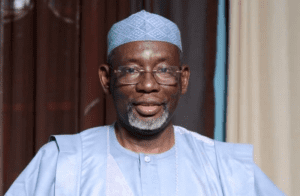Balogun Market: Traders react to shift in resumption date after yuletide
There has been mixed reactions from Balogun Market traders, over the shift in the resumption date for business activities after the Dec. 24 closure of the market for the Christmas and New Year holidays.
The caretaker management committee inaugurated in December to manage the multi-billion Naira complex, had shifted the resumption date from Jan. 4 to Jan. 11, citing insecurity.
However, some of the traders, who spoke to journalists in Lagos, on Sunday, said that the shift was uncalled for; while others viewed it as a welcome development.
Chief Oscar Odogwu, Balogun Market Presidential hopeful in the yet to be conducted election, said that it was a ploy by the committee to stay longer in office than required.
Odogwu, who is the Chief Executive Office of Fragrance World Ltd, described the lockdown of the market for a week, after the Christmas and the New Year break, as “sinister”.
“This is unfriendly to those of us that are daily income earners that have just returned from the yuletide after heavy spending, with empty purse.
“We are the owners of the market; and we are aware that they want to alter the sequence of the build-up to the election, in order to stay beyond their time,” he said.
Mr Sunday Ozonwadi, who also expressed misgivings over the shift in dates, said that some of the traders had goods that were time-bound and the additional week may cause those items to go bad and inflict losses on the owners.
“I am watching and observing with keen interest the ongoing activities of the the so-called caretaker committee. It’s obvious that no far reaching consultation has been reached so far on the part of both the committee and the stakeholders.
“The primary objective of any such interim management is to return the system back to the track of democracy and rule of law, and not lord themselves over us,” Ozonwadi said.
He said that the only thing people expected of the committee was a road map for democratic election, within the time frame allotted to them, and that any other intentions would be rejected by the people.
The current situation whereby thugs were recruited into factions at the complex was a time bomb, that was capable of sinking the place, he added, while calling on all aspirants to play by the rules so as to avoid chaos.
Since the shift in the resumption date has to do with tackling insecurity in the market, there was nothing bad with it, Mrs Ngozi Agbasi said.
Agbasi, a campaign team member for one of the Presidential aspirants, added that it would amount to maladministration if the committee sensed danger and not do something to check it.
Mr Tobis Omoele, another trader, said that those that entrusted the management of the market to the committee knew that, they were capable.
“If staying at home for a week will bring peace to the place so be it, and anything that will take us back to the dark days of blood letting because of elections should be discarded,” he said.
Reacting, Hon. Leonard Ogbonnia, Secretary of the committee, described the allegations made against the committee as unfounded, stressing that they represented opinions of those sponsored by others who did not want the progress of the market.
Ogbonnia, added that the committee was doing everything within its powers to bring lasting peace to the place, and hand over to elected executives within record time.
The committee was mandated to conduct elections that would usher in new executives within a specified time frame.




